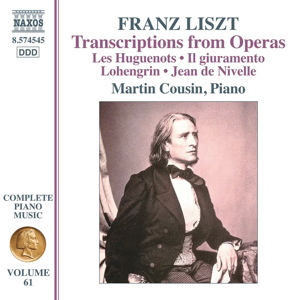
Franz Liszt (1811-1886)
Transcriptions from Operas, Piano Music Vol 61
Grande fantaisie sur des thèmes de l’opéra Les Huguenots de Meyerbeer, S412/R221 ‘Réminiscences des Huguenots’ (1836) (first version)
Fantasia on Italian Operatic Melodies and Mercadante’s Il giuramento, S458/R294 ‘Réminiscences de La Scala’ (1838-39)
Rondeau fantastique sur un thème espagnol, S252/R88 ‘El contrabandista de M. García’ (1836)
Festspiel und Brautlied aus Richard Wagner’s Lohengrin, S446/1/R279/1 (1854) (first version)
La Mandragore, S698/R666 ‘Ballade de l’opéra Jean de Nivelle de L. Delibes’ (1881) (fragment)
Martin Cousin (piano)
rec. 2023, Trinity Concert Hall, Trinity School, Croydon, London, UK
Naxos 8.574545 [79]
Liszt’s operatic transcriptions are always entertaining and the works on this disc are no exception. It’s not always the most illuminating music but it’s fun, virtuosic, and often beautiful.
The Grande fantaisie on themes from Meyerbeer’s Les Huguenots is not one of Liszt’s more popular operatic fantaisies and is surprisingly a more reserved affair than you might expect. There is certainly some virtuosic demand but, considering that this is based on material from an opera known for virtuosic vocal display, Liszt’s transcription does not pull out all the stops in the way that some of his other better known works in the genre do. Martin Cousin’s performance is well-played with a powerful sense of sonority though I find some of the phrasing a little less free than it could be, especially in the lyrical music taken from the famous Act 4 duet between Raoul and Valentine where there’s a chance to further the inherent poetry of the music with a less literal approach. A touch more attention to tonal shading wouldn’t have gone amiss either but it’s a solid performance.
The second work, a Fantasia on melodies from Mercadante’s Il giuramento and an additional fourth theme from an unknown source, seems to me a work of more imaginative scope and varied material. I’m not familiar with Mercadante’s opera but this work makes me think that, if a good recording existed, it might be an enjoyable listen. There are some gorgeous lyrical sections and some exciting bravura passages and if it’s not top drawer Liszt it is at least second tier and very enjoyable. I find Cousin’s performance more effective here, responding more sensitively to the musical material. His playing (such as track 2 – 2:25) is imbued with poetry and he manages a degree more contrast between the lyrical sections and the signature Lisztian virtuoso writing.
The Rondeau fantastique on a Spanish theme is a more outwardly virtuosic work and I don’t find Cousin to be at his best here, the performance being quite slow coming in at 4-5 minutes longer than some other versions. It’s accurately played, but lacking the sparkle and brilliance of those performances which capitalise on the inherent showmanship of the score.
His performance of Festspiel und Brautlied from Wagner’s Lohengrin is also slow compared to others but I would say that it matters a little less here and he is mostly successful though I don’t find anything remarkable in the initial Festspiel section. The famous wedding march is played very attractively and here the slower tempo adds some real romance to a melody that can, in the wrong hands, seem a little banal. The disc closes with a brief (1:28) excerpt of an introduction to a Ballade from an opera of Leo Delibes. It may well have been worked into something beautiful but, though what here might intrigue completists, it offers little in terms of musical interest.
This is a nice selection for Liszt lovers, though for the most part you will find preferable performances elsewhere. For the Grande fantaisie on themes from Les Huguenots there is Arnaldo Cohen’s rendition, also on Naxos (8.553852), which is at least more exciting. Cousin is at his best in the Réminiscences de La Scala, a rarely recorded work but the rondeau fantastique or el contrabandista is easily bettered by France Clidat (Decca 476 4035) which is played in a more outward and confident manner. William Wolfram’s Festspiel und Brautlied is also worth checking out (review); more assured and exuberant in the opening Festspiel though lacking a little of Cousin’s caress in the Brautlied. The recorded sound is good, with a strong bass response, but lacking just a bit of crispness in the upper frequencies.
Morgan Burroughs
Buying this recording via a link below generates revenue for MWI, which helps the site remain free.




















